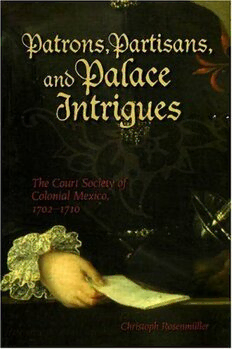
Patrons, Partisans, and Palace Intrigues: The Court Society of Colonial Mexico 1702-1710 (Latin American and Caribbean) PDF
290 Pages·2008·1.885 MB·English
Most books are stored in the elastic cloud where traffic is expensive. For this reason, we have a limit on daily download.
Preview Patrons, Partisans, and Palace Intrigues: The Court Society of Colonial Mexico 1702-1710 (Latin American and Caribbean)
Description:
Palace intrigues & clientelism drove politics at the viceregal court of colonial Mexico. By carefully reconstructing social networks in the court of Viceroy Duke of Alburquerque (1702-1710), Christoph Rosenmuller reveals that the Duke presided over one of the most corrupt viceregal terms in Mexican history. Alburquerque was appointed by Spain's King Philip V at a time when expanding state power was beginning to meet with opposition in colonial Mexico. The Duke & his retainers, though seemingly working for the crown, actually built close alliances with locals to thwart the reform efforts emanating from Spain. Alburquerque collaborated with contraband traders & opposed the secularization of Indian parishes. He persecuted several local craftsmen & merchants, some of whom died after languishing in jail, accusing them of treason to bolster his own credentials as a loyal official. In the end, however, the dominant clique at the royal court in Madrid sought revenge. Alburquerque was forced to pay an unheard-of indemnity of 700,000 silver pesos to regain the king's favour. Dealing with a topic & period largely ignored by historiography, Rosenmuller demonstrates the vast patronage power of the viceroy at the historical watershed between the expiring Habsburg dynasty & the incoming Bourbon rulers. His analysis shows that precursors of the Bourbon reforms & the struggle for Mexican independence were already at play in the early eighteenth century.
See more
The list of books you might like
Most books are stored in the elastic cloud where traffic is expensive. For this reason, we have a limit on daily download.
